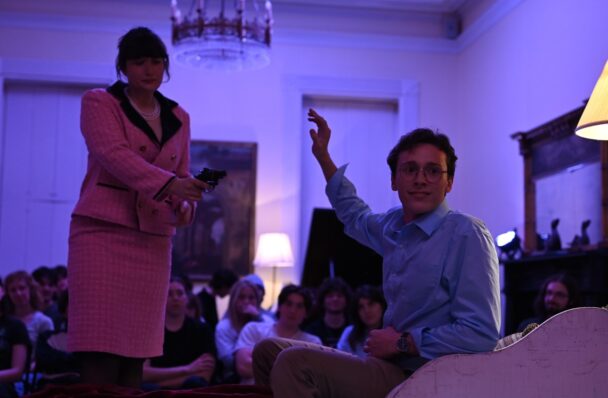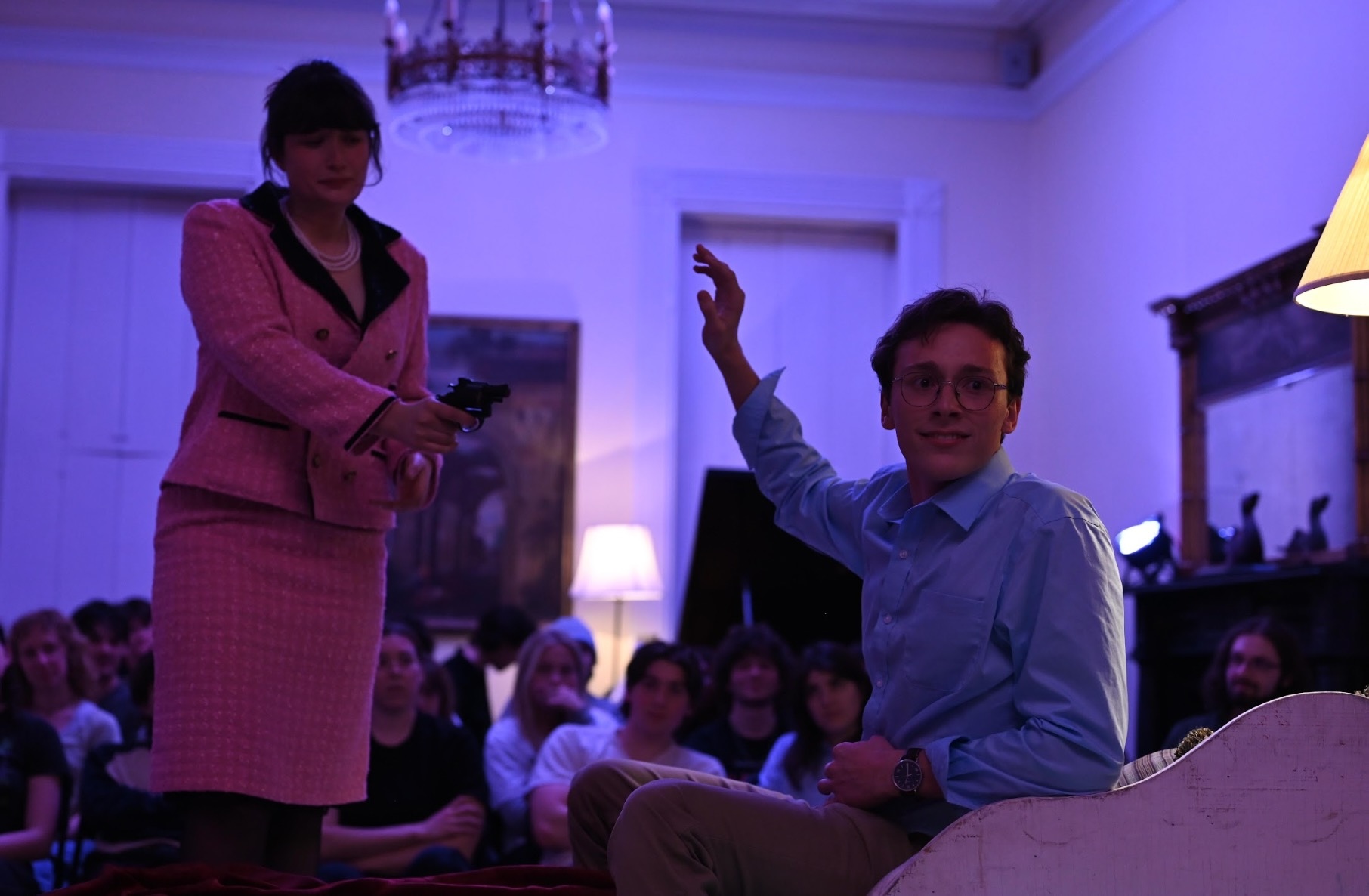
On Friday, April 11, and Saturday, April 12, Spike Tape presented “The House of Yes” at Russell House as part of its Spring 2025 season. Written by Wendy MacLeod, the show was directed by Isa Paley ’26, starred Eliza Marovitz ’25, Matthew Nusbaum ’25, Sage Saling ’26, Kyle Reims ’25, and Daniel Brugger ’26, and was stage-managed by Coco Cooley ’26.
Paley discovered this play after seeing Mark Waters’ 1997 film adaptation of the show on the Criterion Channel. She loved the film, and when it came time to pitch to Spike Tape, she remembered that it was based on the play written by MacLeod.
“I downplayed the incest in my pitch to Spike Tape,” Paley said. “I was scared of leading with [incest] because when I had pitched Spring Awakening to Spike Tape last year, they told me that it deals with themes that might be too sensitive.”
“The House of Yes” is a play about an ultra-wealthy family that lives next door to the Kennedys. The Pascal family consists of a pair of twins, Marty and Jackie; a younger brother, Anthony; and their mother, Mrs. Pascal. Jackie, who is in and out of psychiatric hospitals and on all sorts of medication, is convinced that she’s the infamous Jacqueline Kennedy Onassis.
The play begins with Marty visiting home for Thanksgiving following a recent move to New York, where he sought a life of relative normalcy. He brings home his new fiancée, Lesly, who is from a small town in Pennsylvania. Over the course of the play, the family, trapped in the house by a hurricane, hashes out their past, revealing secrets of their father’s death and the twins’ sexual history, and tests fate when the younger brother fawns over Lesly.
Brugger, who played Mrs. Pascal in drag, outlined his original intent for the character and artistic challenges playing the matriarch. While one might interpret the choice to do drag as stylistically campy, Cooley clarified that this was not the intent of the casting choice.
“We wanted to emphasize that this is a woman, not a drag queen,” Cooley said. “He’s not supposed to be campy; he’s just playing a woman.”
While some directors would be inclined to lean into the campy nature of the play, it is explicitly stated in the script that this would be a mistake.
“It is a great mistake to imagine the play is ‘camp’ because the characters pretend to be Jack and Jackie Kennedy,” MacLeod wrote in the original script. “To do the play that way is to undermine its emotional truth, and the love, however twisted, between the characters.”
Paley reaffirmed that her intention as a director was to lean away from the campiness and take the love the characters had for each other seriously.
“We wanted to play the incest like [it] is right,” Paley said. “I didn’t want to mock them. These characters love each other and that is uncomfortable. It’s a product of insularity and wealth and only watching TV. We take the love seriously because it was already there. These people have love that they don’t know what to do with.”
Marovitz, who assumed the role of Jackie, further remarked on the romantic nature of the relationship.
“I often get cast as characters who use their sexuality over people,” Marovitz said. “But to play Jackie-O, she’s so sad and in love that it felt like a romance. I don’t usually get romance—I usually get sex. It was super exciting for me to not feel like a harlot or the girl in red. I was very much the girl in pink.”
Marovitz and Saling spoke about how having a female directorial team positively shaped their experiences in the rehearsal process.
“I thought about the makeup of ‘House of Yes’ and [decided], ‘I don’t want to turn down a whole bunch of women,’” Marovitz said. “It sounds simple, but it’s what made the whole process what it was…. Being a woman’s murderous lady was what I wanted to be.”
Saling played Lesly, a character who was typically rendered as naive, but Paley and Cooley chose to add more depth to her character.
“When I was doing research before, everything said that she’s very dumb,” Saling said. “That is the forefront of how she’s advertised. But Isa always said that she’s very kind. Isa never made us play into the stupidity of who she was; it was playing into the earnestness and honestness of how she spoke to people in her life. The language for how we sought out her character speaks to how the creative team was built and the success of the show.”
The rendering of both Marty and Anthony, played by Nusbaum and Reims respectively, also offered commentary on sex and gender roles.
“I talked with Kyle a lot about how his character is someone who doesn’t know how to be a person when it comes to romantic relationships,” Paley said. “He says ‘I love you’ before they have sex. That is so ’80s movie to me, where there’s only one sex scene. He doesn’t love her, but he thinks it’s what he’s supposed to say. He thinks he’s supposed to kiss her on the cheek, kiss her forehead, and say ‘sweetie.’”
Kekoa Dowsett ’28, the show’s intimacy coordinator, approached his task differently for different characters. Saling’s scenes contained highly choreographed intimacy, which speaks to how her relationships with the brothers felt like an imitation of tropes in the media.
“With Marty, he feels like Lesly is the person he’s supposed to be with based on the movies and the books,” Paley said. “He’s supposed to be with someone who’s sweet and kind. It’s a good contrast because it’s not supposed to feel rehearsed between the twins—whereas with Anthony and Lesly, it’s supposed to feel rehearsed in this really uncomfortable way.”
Dowsett approached the relationship between Marty and Jackie differently—their love wasn’t choreographed in the same way as Marty and Lesly’s, as it didn’t follow conventional norms.
Paley’s success in making this show has been years in the making. She started as an assistant stage manager on “Assassins,” then became a stage manager for “Twelfth Night” and “Bonar!,” and now has made her directorial debut with “The House of Yes.” What’s next for her and this team? I can’t wait to find out.
Elizabeth Laurence can be reached at elaurence@wesleyan.edu.

Leave a Reply